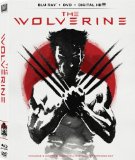| Reviews & Columns |
|
Reviews DVD TV on DVD Blu-ray 4K UHD International DVDs In Theaters Reviews by Studio Video Games Features Collector Series DVDs Easter Egg Database Interviews DVD Talk Radio Feature Articles Columns Anime Talk DVD Savant Horror DVDs The M.O.D. Squad Art House HD Talk Silent DVD
|
DVD Talk Forum |
|
|
| Resources |
|
DVD Price Search Customer Service #'s RCE Info Links |
|
Columns
|
|
|
Wolverine, The
Fox // PG-13 // December 3, 2013
List Price: $39.99 [Buy now and save at Amazon]
The Film:
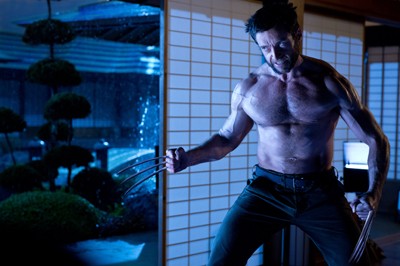 Over the past several years, the X-Men film universe has experienced a wide range of peaks and valleys, especially when it comes to Wolverine. While fans of the original series had some the bad taste left by The Last Stand cleansed by Matthew Vaughn's X-Men: First Class, essentially a reboot that explores the heroes' origins, the exploits of the immortal, health-regenerating beast with adamantium claws and a somber outlook fizzled with the dull and detached X-Men Origins: Wolverine. From the early points in its production when Darren Aronofsky and Christopher McQuarrie had thrown their hats in the ring, this latest chapter in the character's arc seemed engineered to break from the mold and soldier on in a brave direction, far from the past six years of stumbles. My enthusiasm levels fluctuated once 3:10 to Yuma and Knight and Day's James Mangold took over as director, but perhaps that was premature: he's still delivered something daring and largely absorbing in The Wolverine, elevating the character with a blockbuster that smartly diverges from the bloat plaguing most comic-book films.
Over the past several years, the X-Men film universe has experienced a wide range of peaks and valleys, especially when it comes to Wolverine. While fans of the original series had some the bad taste left by The Last Stand cleansed by Matthew Vaughn's X-Men: First Class, essentially a reboot that explores the heroes' origins, the exploits of the immortal, health-regenerating beast with adamantium claws and a somber outlook fizzled with the dull and detached X-Men Origins: Wolverine. From the early points in its production when Darren Aronofsky and Christopher McQuarrie had thrown their hats in the ring, this latest chapter in the character's arc seemed engineered to break from the mold and soldier on in a brave direction, far from the past six years of stumbles. My enthusiasm levels fluctuated once 3:10 to Yuma and Knight and Day's James Mangold took over as director, but perhaps that was premature: he's still delivered something daring and largely absorbing in The Wolverine, elevating the character with a blockbuster that smartly diverges from the bloat plaguing most comic-book films.
Fitting somewhere between McQuarrie's original script ideas and rewrites from Mark Bomback (Live Free or Die Hard) and Scott Frank (The Lookout), The Wolverine is closer to the type of film that Origins should've been, one more interested in the personal drama of Logan's anguish and the drawbacks of his mutation. After flashbacks to his experiences in World War II where he saved a prominent Japanese officer, the story begins with Logan secluded in the Canadian wilderness after the events of The Last Stand, though the only significance of this post-event period would be the death of Jean Grey (and her recurring presence in his dreams). Soon after our reintroduction, a quirky, clairvoyant, katana-toting red-haired Japanese woman, Yukio (Rila Fukushima), hunts Logan down to deliver a message about the officer, Yashida (Hal Yamanouchi), he once saved, inviting him to Japan for a visit before the man's death. Once he arrives, however, it's revealed that Yashida, now the owner of a substantial technology firm, instead has an offer for the mutant: to remove his immortality and regeneration, allowing him to live a normal life ... then pass away.
Consider for a moment that a film dedicated to one member of the X-men focuses on the depletion of his mutant abilities and credibly placing him, without his comrades, in a strange land. While other standard superhero elements arise as The Wolverine progresses (some jammed in to make it more comic-booky), the core idea ventures into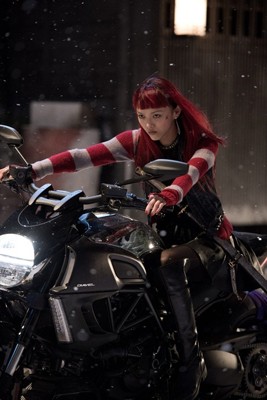 unconventional territory that intentionally subverts the expectations one might have about this kind of film: while undeniably important, superhuman powers are rarely in use. Eventually, and this is only a mild spoiler given the film's obvious purposes, Logan does experience the effects of drained powers as a struggle -- an assassination attempt -- erupts within the Yashida clan that'd be a whole lot easier to sort out if he were at full strength. This leaves him in a state where dealing with human aggressors and their artillery becomes an actual ordeal, forcing him in conflict with brutal, street-wise Yakuza and agile members of a ninja organization.
unconventional territory that intentionally subverts the expectations one might have about this kind of film: while undeniably important, superhuman powers are rarely in use. Eventually, and this is only a mild spoiler given the film's obvious purposes, Logan does experience the effects of drained powers as a struggle -- an assassination attempt -- erupts within the Yashida clan that'd be a whole lot easier to sort out if he were at full strength. This leaves him in a state where dealing with human aggressors and their artillery becomes an actual ordeal, forcing him in conflict with brutal, street-wise Yakuza and agile members of a ninja organization.
Therefore, most of the action in The Wolverine stays grounded since the playing field has been somewhat leveled due to Logan's handicap -- well, aside from the fact that he can still whip out his claws and soldier on after taking bullets. Those looking for an out-and-out superhero film might struggle with what James Mangold has competently fused together here: aside from one outlandish sequence involving a bullet train, a significant amount of the film's activity revolves around an ailing mutant in brawls that aren't too far removed from standard martial-arts / gangster fare. Moreover, Logan isn't out to save the world in this scenario, where the pieces put in motion encompass a more confined, intimate scope involving corporate bureaucracy and the conflict within a Japanese family's hierarchy. In place of this lack of Weapon X power-fantasy, the action takes on a brutal, sobering attitude that emphasizes Logan's reliance on brute force and durability over technique, with sturdy photography and tight editing that reveals what happens when his bullheaded tactics aren't as useful.
Interestingly, the brand of action enhances Logan's participation in the Yashida-clan drama instead of doling out mindless blade-snicking set-pieces, again designed to bring the focus back to him as a conflicted individual instead of merely a nomadic antihero destined to save the day. Between packing on a significant amount of muscle and the opportunities for him to brood over his lost love and obscured purpose, Hugh Jackman nails this more ominous and bestial form of Wolverine, significantly improving upon the persona he's become famous for over the years. The way he bridges the gap between his steely despondence while navigating through Japan and his warmer, open presence during the Jean Grey flashbacks provides an interesting outlook on his mentality, enhancing the relationship that forms between Logan and Yashida's granddaughter, Mariko (Tao Okamoto), the target of the Yakuza assassination attempt and a somewhat shallow rendering of a character who coaxes intimacy back out of the beast.
The Wolverine's script doesn't neglect the Japanese setting, either, namely incorporating it as an intriguing mode of introspection around how Logan has lost his way. Surface-level details like the cubic love hotels in Tokyo and the bombing site at Nagasaki add expected tones to the story, sure, while the old-world feel of the Yashida clan's grand Japanese manor and waterside cottage create an environment rich with history, complete with sparring samurais and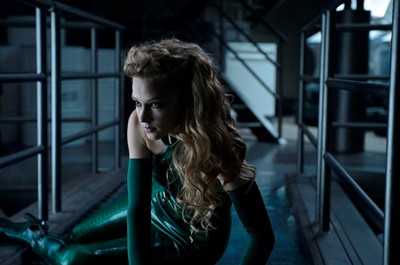 meaningful murals on the walls that juxtapose with modern-day sketches and technology. It's the introduction of the restless spirit of the beast and the aimless nature of a ronin that apply directly to the mutant's internal turmoil, though. They add that layer of complexity to his gruff personality and history that I would've liked to have seen in Origins: Wolverine, following up nicely to the events in X2 and/or The Last Stand by using that trauma to focus on something with dramatic weight, as well as reverence to the character's foundation in the books.
meaningful murals on the walls that juxtapose with modern-day sketches and technology. It's the introduction of the restless spirit of the beast and the aimless nature of a ronin that apply directly to the mutant's internal turmoil, though. They add that layer of complexity to his gruff personality and history that I would've liked to have seen in Origins: Wolverine, following up nicely to the events in X2 and/or The Last Stand by using that trauma to focus on something with dramatic weight, as well as reverence to the character's foundation in the books.
Despite feeling more enthusiastic than expected about Mangold's serious take on Wolverine, it's also not difficult to pinpoint where the film buckles under the weight of hokey comic-book contrivances and excess, from how Logan loses (and eventually regains) his powers to the flimsy and somewhat disposable presence of Dr. "Viper" Green (Svetlana Khodchenkova) as an extension of the primary antagonistic force. That all leads to a boisterous finale that, despite delivering hard-hitting goods that'll satisfy those yearning for traditional mutant fisticuffs and a few references, becomes a pretty out-there, loose-logic bookend to this surprisingly anchored departure from that sort of thing. To the end, though, despite the zaniness, The Wolverine ultimately sticks it out as one of the grittier portrayals of the boorish antihero. It's a pity that we weren't able to see the more avant-garde version of Logan's journey to Japan that was considered, but Mangold still took a reasonable stab at breaking down conventions here.
So, What's the Deal with the Extended Cut? (Mild Spoilers)
As of the middle of November or so, two cuts of The Wolverine have been floating around: the theatrical cut (2:06:08) and a twelve-minute longer extended cut (2:18:05) screened for the public and available on-demand, now also out on Blu-ray (see below). While the differences are minimal and somewhat indulgent, they do make an impact that'll ensure that it's the cut I'll personally view in the future. Several quick instances of added gore and language dirty things up to fit the "unrated" title, as well as a few brief but consequential bits of extra character development, but it also has a pair of significant additions that hammer the point home: a cut sequence during the love hotel period in Tokyo, which establishes Mariko's ability to throw knives/blades; and a brutal, arterial-spraying segment inserted at the beginning of the film's big ninja-vs.-Wolverine brawl, involving an intense snow machine and stronger emphasis on Yukio's assistance. The ending, however, has stayed intact; the easter egg featuring Logan's costume has not been added. What this cut does is move Mangold's film a bit closer to earning an R-rating, despite the content ultimately achieving the same purposes.
The Blu-ray:
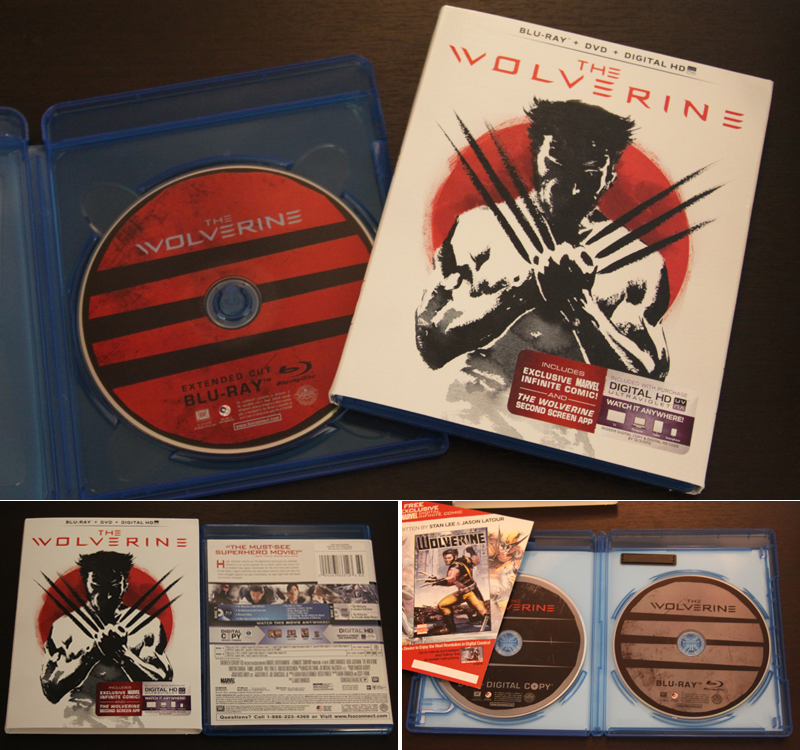
Fox Home Entertainment have presented The Wolverine in a standard two-disc Blu-ray case, with Disc One as the theatrical cut of the film and Disc Two being the DVD/Digital Copy. The artwork on the cover and slipcase elegantly replicates the teaser poster design found at the theaters, featuring a faux-watercolor rendition of Wolverine's silhouette with the red Japanese sun behind him. Unfortunately, the folks at Fox have orchestrated something a tad frustrating with the release of James Mangold's film: there's also that Extended Cut of the film (the red Blu-ray disc pictured above), but it's only available either through on-demand services or, and here's the kicker, in the 3D presentation on a separate disc. Therefore, those with interest in the (slightly superior) extended cut will either need to pony up for the larger release or seek out a used third-party option. Keep in mind that the extended cut also comes with an exclusive commentary with James Mangold, so it'll be worth the hunt.
Video and Audio:
Put bluntly? Fox's rendering of The Wolverine on Blu-ray should go down as one of the most striking of the year, starting with the exemplary, nuanced 2.39:1-framed, 1080p AVC digital transfer. You'd expect for a modern comic-book blockbuster to boast high-caliber photography, yet Ross Emery's work here delivers in more than a few unexpected ways, namely in the deep contrast levels during nighttime/interior sequences that never miss a beat. Skin tones stay balanced and responsive during close-ups, while the sheen of refracted light on faces and against the metal of swords and claws stays exceptionally authentic. Oftentimes, it's a shockingly colorful film: neon and warm lights in the Tokyo setting are vibrant and aware of the darkness surrounding them, while blasts of acidic green, the vibrancy of Yukio's red hair, and blues in water and overcast skies are exceptionally rock-solid. More than that, though, every inch of this film sports a vivid, natural palette that accurately replicates its appearance in the cinema, and it comes together into a work of occasionally-artful beauty that's expected of bigger budgets.
It's tough to decide whether the visual treatment or the accompanying 7.1 Master Audio beast stands out more in terms of quality, but, to say the least, there's certainly seems to be little room for improvement for this fierce track. Everything you could want out of a demo-worthy sonic onslaught can be found here: ambient elements like rainfall, street chatter, and bass thumping in an adjacent room envelop the stage with razor-sharp ambience; clanking blades, sliding doors, and searing toxins aggressively push the limits of front-end clarity; and explosions, falling bodies, and the thwomp of arrows provide assertive, balanced bass activity. No matter the intensity of dialogue delivery, it stays well-composed and avoids any higher-level distortion, while the rich mix of different musical styles in the score -- thumping modernistic bass here, then traditional orchestral tones there -- vividly sprawls out among all channels. Once The Wolverine gets its aural surroundings established, it doesn't let go until the highly-aggressive action-packed end. Optional English, Spanish, and Portuguese language and subtitle options are available.
Special Features:
While the number of on-disc supplements isn't very numerous, the entirety of The Path of the Ronin (53:44, 16x9 HD) works exceptionally hard to make up the difference. While separated into five sections with noticeable partitions, the overall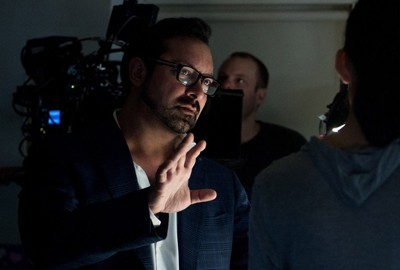 thrust of the nearly hour-long stretch of material effortlessly bleeds into one another, detailing the inspiration, conceptualization, and realization of this unique and popular take on Wolverine's experiences in Japan. Interviews with James Mangold, Hugh Jackman, and a host of comic-book writers, production designers, and actors comingle with behind-the-scenes shots and concept sketches, and while it does lean towards an overall press-kit feeling, there's a lot to appreciate both in what's heard and seen.
thrust of the nearly hour-long stretch of material effortlessly bleeds into one another, detailing the inspiration, conceptualization, and realization of this unique and popular take on Wolverine's experiences in Japan. Interviews with James Mangold, Hugh Jackman, and a host of comic-book writers, production designers, and actors comingle with behind-the-scenes shots and concept sketches, and while it does lean towards an overall press-kit feeling, there's a lot to appreciate both in what's heard and seen.
Inspiration: A Ronin's Journey (11:26) reveals that Mangold has a real understanding of the deeper aspects of Wolverine's immortality and loss as he offers details about elements he interjected into the writing process, such as deciding to focus on the post-X3 universe to relish that bleaker tone, while Wolverine writers/creators Chris Claremont and Len Wein weigh in on their perspective on bringing the Japan narrative to the big screen. Design: Mastering the Arc (15:42) discusses the balance between fantasy and reality, color selections, and filming on location in Japan in order to create an iconic style and bottle a "human" element for the film, while attaching the idea of Wolverine being a fish-outta-water in this unique atmosphere. Some slick concept designs and screen tests also appear in this segment, showing how they arrived at this blend of elements and palettes in the film.
After that, the feature moves into content revolving around realizing the characters and establishing their personal, starting with Execution: A Killer Team (19:04). The most significant takeaway from this segment, aside from the crew's appreciation, is the relative inexperience of Tao Okamoto and Rila Fukushima, alongside Mangold's insistence on staying authentic with the Japanese casting. Famke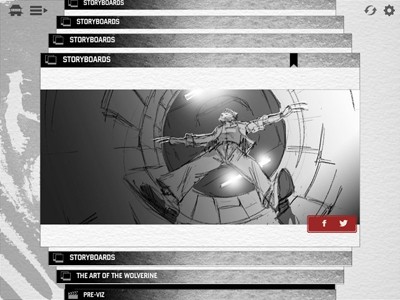 Janssen also makes an appearance to talk a bit about her deaths in the previous films and what the flashback sequences signify. Mangold's direction quality and ability to obtain great performances takes up the second half, while Hugh Jackman gets his own section, The Man Behind the Mutant (6:19, HD), to discuss his passion for the rage and vulnerability in the role, as well as physically preparing for it. It's capped off with The Evolution of Wolverine (1:56), but, really, that bit at the end just serves as an overview-style conclusion without any real new content (aside from a few more behind-the-scenes glimpses).
Janssen also makes an appearance to talk a bit about her deaths in the previous films and what the flashback sequences signify. Mangold's direction quality and ability to obtain great performances takes up the second half, while Hugh Jackman gets his own section, The Man Behind the Mutant (6:19, HD), to discuss his passion for the rage and vulnerability in the role, as well as physically preparing for it. It's capped off with The Evolution of Wolverine (1:56), but, really, that bit at the end just serves as an overview-style conclusion without any real new content (aside from a few more behind-the-scenes glimpses).
Aside from a Theatrical Trailer (2:28, 16x9 HD) and a very brief X-Men: Days of Future Past Set Tour (2:47, 16x9 HD), featuring some familiar sets and quick candid shot of a few actors as Bryan Singer offers his services as a tour guide, there's also the now somewhat-renowned Alternate Ending (1:36, 16x9 HD). Nothing has been changed from the tone and purpose of the original ending, at all, save one significant detail for hardcore Wolverine fans: the reveal of the class yellow-and-brown suit, in a suitcase handed over to Wolverine at the very end. While the minor detail is very cool, it also seems a little overtly referential and makes the following line of dialogue with Yukio a bit awkward. The Blu-ray has also been enabled with syncing to a Second Screen app (pictured to the side), which includes pre-visualization videos and concept artwork. Over a Wi-Fi connection, the syncing process is painless -- the manual sync seems like more of a pill -- and the app's reactivity to the material on your television (and pausing) is spot-on.
Final Thoughts:
James Mangold has delivered a surprise with The Wolverine, a straight-played, distinctive, and meditative franchise spin-off that manages to flesh out the eponymous title character during his journey to Japan. While it's sporadically guilty of a few of genre issues (especially in the loopy final act) and potentially takes itself a bit too seriously for some tastes, it's also surprisingly effective when acting as a personal drama about a man laden with sorrow and confronting the pitfalls of his immortality and feeling of purposelessness. Restrained battles involving a weakened Logan's confrontation with mere men (ninjas, Yakuza) allow the action to feel gritty and physically demanding, while the smaller scope of the conflict -- the removal of Wolverine's powers and the corporate battle within the Yashida clan -- provides just enough of an intriguing plot to keep the momentum moving during Logan's own battle with his inner demons.
While I'd personally opt for the lengthier, bloodier, and slightly more developed extended cut of The Wolverine, only available in the 3D presentation from Fox Home Entertainment, the differences are fairly negligible and don't significantly impact plot points to a degree where I wouldn't also recommend the theatrical cut -- especially since they both appear pretty much flawless on Blu-ray. Extras here include nearly an hour's worth of moderately substantial featurettes and that oft-discussed alternate ending with a twinge of fanserveice. Highly Recommended.
Thomas Spurlin, Staff Reviewer -- DVDTalk Reviews | Personal Blog/Site
 Over the past several years, the X-Men film universe has experienced a wide range of peaks and valleys, especially when it comes to Wolverine. While fans of the original series had some the bad taste left by The Last Stand cleansed by Matthew Vaughn's X-Men: First Class, essentially a reboot that explores the heroes' origins, the exploits of the immortal, health-regenerating beast with adamantium claws and a somber outlook fizzled with the dull and detached X-Men Origins: Wolverine. From the early points in its production when Darren Aronofsky and Christopher McQuarrie had thrown their hats in the ring, this latest chapter in the character's arc seemed engineered to break from the mold and soldier on in a brave direction, far from the past six years of stumbles. My enthusiasm levels fluctuated once 3:10 to Yuma and Knight and Day's James Mangold took over as director, but perhaps that was premature: he's still delivered something daring and largely absorbing in The Wolverine, elevating the character with a blockbuster that smartly diverges from the bloat plaguing most comic-book films.
Over the past several years, the X-Men film universe has experienced a wide range of peaks and valleys, especially when it comes to Wolverine. While fans of the original series had some the bad taste left by The Last Stand cleansed by Matthew Vaughn's X-Men: First Class, essentially a reboot that explores the heroes' origins, the exploits of the immortal, health-regenerating beast with adamantium claws and a somber outlook fizzled with the dull and detached X-Men Origins: Wolverine. From the early points in its production when Darren Aronofsky and Christopher McQuarrie had thrown their hats in the ring, this latest chapter in the character's arc seemed engineered to break from the mold and soldier on in a brave direction, far from the past six years of stumbles. My enthusiasm levels fluctuated once 3:10 to Yuma and Knight and Day's James Mangold took over as director, but perhaps that was premature: he's still delivered something daring and largely absorbing in The Wolverine, elevating the character with a blockbuster that smartly diverges from the bloat plaguing most comic-book films. Fitting somewhere between McQuarrie's original script ideas and rewrites from Mark Bomback (Live Free or Die Hard) and Scott Frank (The Lookout), The Wolverine is closer to the type of film that Origins should've been, one more interested in the personal drama of Logan's anguish and the drawbacks of his mutation. After flashbacks to his experiences in World War II where he saved a prominent Japanese officer, the story begins with Logan secluded in the Canadian wilderness after the events of The Last Stand, though the only significance of this post-event period would be the death of Jean Grey (and her recurring presence in his dreams). Soon after our reintroduction, a quirky, clairvoyant, katana-toting red-haired Japanese woman, Yukio (Rila Fukushima), hunts Logan down to deliver a message about the officer, Yashida (Hal Yamanouchi), he once saved, inviting him to Japan for a visit before the man's death. Once he arrives, however, it's revealed that Yashida, now the owner of a substantial technology firm, instead has an offer for the mutant: to remove his immortality and regeneration, allowing him to live a normal life ... then pass away.
Consider for a moment that a film dedicated to one member of the X-men focuses on the depletion of his mutant abilities and credibly placing him, without his comrades, in a strange land. While other standard superhero elements arise as The Wolverine progresses (some jammed in to make it more comic-booky), the core idea ventures into
 unconventional territory that intentionally subverts the expectations one might have about this kind of film: while undeniably important, superhuman powers are rarely in use. Eventually, and this is only a mild spoiler given the film's obvious purposes, Logan does experience the effects of drained powers as a struggle -- an assassination attempt -- erupts within the Yashida clan that'd be a whole lot easier to sort out if he were at full strength. This leaves him in a state where dealing with human aggressors and their artillery becomes an actual ordeal, forcing him in conflict with brutal, street-wise Yakuza and agile members of a ninja organization.
unconventional territory that intentionally subverts the expectations one might have about this kind of film: while undeniably important, superhuman powers are rarely in use. Eventually, and this is only a mild spoiler given the film's obvious purposes, Logan does experience the effects of drained powers as a struggle -- an assassination attempt -- erupts within the Yashida clan that'd be a whole lot easier to sort out if he were at full strength. This leaves him in a state where dealing with human aggressors and their artillery becomes an actual ordeal, forcing him in conflict with brutal, street-wise Yakuza and agile members of a ninja organization. Therefore, most of the action in The Wolverine stays grounded since the playing field has been somewhat leveled due to Logan's handicap -- well, aside from the fact that he can still whip out his claws and soldier on after taking bullets. Those looking for an out-and-out superhero film might struggle with what James Mangold has competently fused together here: aside from one outlandish sequence involving a bullet train, a significant amount of the film's activity revolves around an ailing mutant in brawls that aren't too far removed from standard martial-arts / gangster fare. Moreover, Logan isn't out to save the world in this scenario, where the pieces put in motion encompass a more confined, intimate scope involving corporate bureaucracy and the conflict within a Japanese family's hierarchy. In place of this lack of Weapon X power-fantasy, the action takes on a brutal, sobering attitude that emphasizes Logan's reliance on brute force and durability over technique, with sturdy photography and tight editing that reveals what happens when his bullheaded tactics aren't as useful.
Interestingly, the brand of action enhances Logan's participation in the Yashida-clan drama instead of doling out mindless blade-snicking set-pieces, again designed to bring the focus back to him as a conflicted individual instead of merely a nomadic antihero destined to save the day. Between packing on a significant amount of muscle and the opportunities for him to brood over his lost love and obscured purpose, Hugh Jackman nails this more ominous and bestial form of Wolverine, significantly improving upon the persona he's become famous for over the years. The way he bridges the gap between his steely despondence while navigating through Japan and his warmer, open presence during the Jean Grey flashbacks provides an interesting outlook on his mentality, enhancing the relationship that forms between Logan and Yashida's granddaughter, Mariko (Tao Okamoto), the target of the Yakuza assassination attempt and a somewhat shallow rendering of a character who coaxes intimacy back out of the beast.
The Wolverine's script doesn't neglect the Japanese setting, either, namely incorporating it as an intriguing mode of introspection around how Logan has lost his way. Surface-level details like the cubic love hotels in Tokyo and the bombing site at Nagasaki add expected tones to the story, sure, while the old-world feel of the Yashida clan's grand Japanese manor and waterside cottage create an environment rich with history, complete with sparring samurais and
 meaningful murals on the walls that juxtapose with modern-day sketches and technology. It's the introduction of the restless spirit of the beast and the aimless nature of a ronin that apply directly to the mutant's internal turmoil, though. They add that layer of complexity to his gruff personality and history that I would've liked to have seen in Origins: Wolverine, following up nicely to the events in X2 and/or The Last Stand by using that trauma to focus on something with dramatic weight, as well as reverence to the character's foundation in the books.
meaningful murals on the walls that juxtapose with modern-day sketches and technology. It's the introduction of the restless spirit of the beast and the aimless nature of a ronin that apply directly to the mutant's internal turmoil, though. They add that layer of complexity to his gruff personality and history that I would've liked to have seen in Origins: Wolverine, following up nicely to the events in X2 and/or The Last Stand by using that trauma to focus on something with dramatic weight, as well as reverence to the character's foundation in the books. Despite feeling more enthusiastic than expected about Mangold's serious take on Wolverine, it's also not difficult to pinpoint where the film buckles under the weight of hokey comic-book contrivances and excess, from how Logan loses (and eventually regains) his powers to the flimsy and somewhat disposable presence of Dr. "Viper" Green (Svetlana Khodchenkova) as an extension of the primary antagonistic force. That all leads to a boisterous finale that, despite delivering hard-hitting goods that'll satisfy those yearning for traditional mutant fisticuffs and a few references, becomes a pretty out-there, loose-logic bookend to this surprisingly anchored departure from that sort of thing. To the end, though, despite the zaniness, The Wolverine ultimately sticks it out as one of the grittier portrayals of the boorish antihero. It's a pity that we weren't able to see the more avant-garde version of Logan's journey to Japan that was considered, but Mangold still took a reasonable stab at breaking down conventions here.
So, What's the Deal with the Extended Cut? (Mild Spoilers)
As of the middle of November or so, two cuts of The Wolverine have been floating around: the theatrical cut (2:06:08) and a twelve-minute longer extended cut (2:18:05) screened for the public and available on-demand, now also out on Blu-ray (see below). While the differences are minimal and somewhat indulgent, they do make an impact that'll ensure that it's the cut I'll personally view in the future. Several quick instances of added gore and language dirty things up to fit the "unrated" title, as well as a few brief but consequential bits of extra character development, but it also has a pair of significant additions that hammer the point home: a cut sequence during the love hotel period in Tokyo, which establishes Mariko's ability to throw knives/blades; and a brutal, arterial-spraying segment inserted at the beginning of the film's big ninja-vs.-Wolverine brawl, involving an intense snow machine and stronger emphasis on Yukio's assistance. The ending, however, has stayed intact; the easter egg featuring Logan's costume has not been added. What this cut does is move Mangold's film a bit closer to earning an R-rating, despite the content ultimately achieving the same purposes.
The Blu-ray:

Fox Home Entertainment have presented The Wolverine in a standard two-disc Blu-ray case, with Disc One as the theatrical cut of the film and Disc Two being the DVD/Digital Copy. The artwork on the cover and slipcase elegantly replicates the teaser poster design found at the theaters, featuring a faux-watercolor rendition of Wolverine's silhouette with the red Japanese sun behind him. Unfortunately, the folks at Fox have orchestrated something a tad frustrating with the release of James Mangold's film: there's also that Extended Cut of the film (the red Blu-ray disc pictured above), but it's only available either through on-demand services or, and here's the kicker, in the 3D presentation on a separate disc. Therefore, those with interest in the (slightly superior) extended cut will either need to pony up for the larger release or seek out a used third-party option. Keep in mind that the extended cut also comes with an exclusive commentary with James Mangold, so it'll be worth the hunt.
Video and Audio:
Put bluntly? Fox's rendering of The Wolverine on Blu-ray should go down as one of the most striking of the year, starting with the exemplary, nuanced 2.39:1-framed, 1080p AVC digital transfer. You'd expect for a modern comic-book blockbuster to boast high-caliber photography, yet Ross Emery's work here delivers in more than a few unexpected ways, namely in the deep contrast levels during nighttime/interior sequences that never miss a beat. Skin tones stay balanced and responsive during close-ups, while the sheen of refracted light on faces and against the metal of swords and claws stays exceptionally authentic. Oftentimes, it's a shockingly colorful film: neon and warm lights in the Tokyo setting are vibrant and aware of the darkness surrounding them, while blasts of acidic green, the vibrancy of Yukio's red hair, and blues in water and overcast skies are exceptionally rock-solid. More than that, though, every inch of this film sports a vivid, natural palette that accurately replicates its appearance in the cinema, and it comes together into a work of occasionally-artful beauty that's expected of bigger budgets.
It's tough to decide whether the visual treatment or the accompanying 7.1 Master Audio beast stands out more in terms of quality, but, to say the least, there's certainly seems to be little room for improvement for this fierce track. Everything you could want out of a demo-worthy sonic onslaught can be found here: ambient elements like rainfall, street chatter, and bass thumping in an adjacent room envelop the stage with razor-sharp ambience; clanking blades, sliding doors, and searing toxins aggressively push the limits of front-end clarity; and explosions, falling bodies, and the thwomp of arrows provide assertive, balanced bass activity. No matter the intensity of dialogue delivery, it stays well-composed and avoids any higher-level distortion, while the rich mix of different musical styles in the score -- thumping modernistic bass here, then traditional orchestral tones there -- vividly sprawls out among all channels. Once The Wolverine gets its aural surroundings established, it doesn't let go until the highly-aggressive action-packed end. Optional English, Spanish, and Portuguese language and subtitle options are available.
Special Features:
While the number of on-disc supplements isn't very numerous, the entirety of The Path of the Ronin (53:44, 16x9 HD) works exceptionally hard to make up the difference. While separated into five sections with noticeable partitions, the overall
 thrust of the nearly hour-long stretch of material effortlessly bleeds into one another, detailing the inspiration, conceptualization, and realization of this unique and popular take on Wolverine's experiences in Japan. Interviews with James Mangold, Hugh Jackman, and a host of comic-book writers, production designers, and actors comingle with behind-the-scenes shots and concept sketches, and while it does lean towards an overall press-kit feeling, there's a lot to appreciate both in what's heard and seen.
thrust of the nearly hour-long stretch of material effortlessly bleeds into one another, detailing the inspiration, conceptualization, and realization of this unique and popular take on Wolverine's experiences in Japan. Interviews with James Mangold, Hugh Jackman, and a host of comic-book writers, production designers, and actors comingle with behind-the-scenes shots and concept sketches, and while it does lean towards an overall press-kit feeling, there's a lot to appreciate both in what's heard and seen. Inspiration: A Ronin's Journey (11:26) reveals that Mangold has a real understanding of the deeper aspects of Wolverine's immortality and loss as he offers details about elements he interjected into the writing process, such as deciding to focus on the post-X3 universe to relish that bleaker tone, while Wolverine writers/creators Chris Claremont and Len Wein weigh in on their perspective on bringing the Japan narrative to the big screen. Design: Mastering the Arc (15:42) discusses the balance between fantasy and reality, color selections, and filming on location in Japan in order to create an iconic style and bottle a "human" element for the film, while attaching the idea of Wolverine being a fish-outta-water in this unique atmosphere. Some slick concept designs and screen tests also appear in this segment, showing how they arrived at this blend of elements and palettes in the film.
After that, the feature moves into content revolving around realizing the characters and establishing their personal, starting with Execution: A Killer Team (19:04). The most significant takeaway from this segment, aside from the crew's appreciation, is the relative inexperience of Tao Okamoto and Rila Fukushima, alongside Mangold's insistence on staying authentic with the Japanese casting. Famke
 Janssen also makes an appearance to talk a bit about her deaths in the previous films and what the flashback sequences signify. Mangold's direction quality and ability to obtain great performances takes up the second half, while Hugh Jackman gets his own section, The Man Behind the Mutant (6:19, HD), to discuss his passion for the rage and vulnerability in the role, as well as physically preparing for it. It's capped off with The Evolution of Wolverine (1:56), but, really, that bit at the end just serves as an overview-style conclusion without any real new content (aside from a few more behind-the-scenes glimpses).
Janssen also makes an appearance to talk a bit about her deaths in the previous films and what the flashback sequences signify. Mangold's direction quality and ability to obtain great performances takes up the second half, while Hugh Jackman gets his own section, The Man Behind the Mutant (6:19, HD), to discuss his passion for the rage and vulnerability in the role, as well as physically preparing for it. It's capped off with The Evolution of Wolverine (1:56), but, really, that bit at the end just serves as an overview-style conclusion without any real new content (aside from a few more behind-the-scenes glimpses). Aside from a Theatrical Trailer (2:28, 16x9 HD) and a very brief X-Men: Days of Future Past Set Tour (2:47, 16x9 HD), featuring some familiar sets and quick candid shot of a few actors as Bryan Singer offers his services as a tour guide, there's also the now somewhat-renowned Alternate Ending (1:36, 16x9 HD). Nothing has been changed from the tone and purpose of the original ending, at all, save one significant detail for hardcore Wolverine fans: the reveal of the class yellow-and-brown suit, in a suitcase handed over to Wolverine at the very end. While the minor detail is very cool, it also seems a little overtly referential and makes the following line of dialogue with Yukio a bit awkward. The Blu-ray has also been enabled with syncing to a Second Screen app (pictured to the side), which includes pre-visualization videos and concept artwork. Over a Wi-Fi connection, the syncing process is painless -- the manual sync seems like more of a pill -- and the app's reactivity to the material on your television (and pausing) is spot-on.
Final Thoughts:
James Mangold has delivered a surprise with The Wolverine, a straight-played, distinctive, and meditative franchise spin-off that manages to flesh out the eponymous title character during his journey to Japan. While it's sporadically guilty of a few of genre issues (especially in the loopy final act) and potentially takes itself a bit too seriously for some tastes, it's also surprisingly effective when acting as a personal drama about a man laden with sorrow and confronting the pitfalls of his immortality and feeling of purposelessness. Restrained battles involving a weakened Logan's confrontation with mere men (ninjas, Yakuza) allow the action to feel gritty and physically demanding, while the smaller scope of the conflict -- the removal of Wolverine's powers and the corporate battle within the Yashida clan -- provides just enough of an intriguing plot to keep the momentum moving during Logan's own battle with his inner demons.
While I'd personally opt for the lengthier, bloodier, and slightly more developed extended cut of The Wolverine, only available in the 3D presentation from Fox Home Entertainment, the differences are fairly negligible and don't significantly impact plot points to a degree where I wouldn't also recommend the theatrical cut -- especially since they both appear pretty much flawless on Blu-ray. Extras here include nearly an hour's worth of moderately substantial featurettes and that oft-discussed alternate ending with a twinge of fanserveice. Highly Recommended.
|
| Popular Reviews |
| Sponsored Links |
|
|
| Sponsored Links |
|
|
| Release List | Reviews | Shop | Newsletter | Forum | DVD Giveaways | Blu-Ray | Advertise |
|
Copyright 2024 DVDTalk.com All Rights Reserved. Legal Info, Privacy Policy, Terms of Use,
Manage Preferences,
Your Privacy Choices | |||||||









